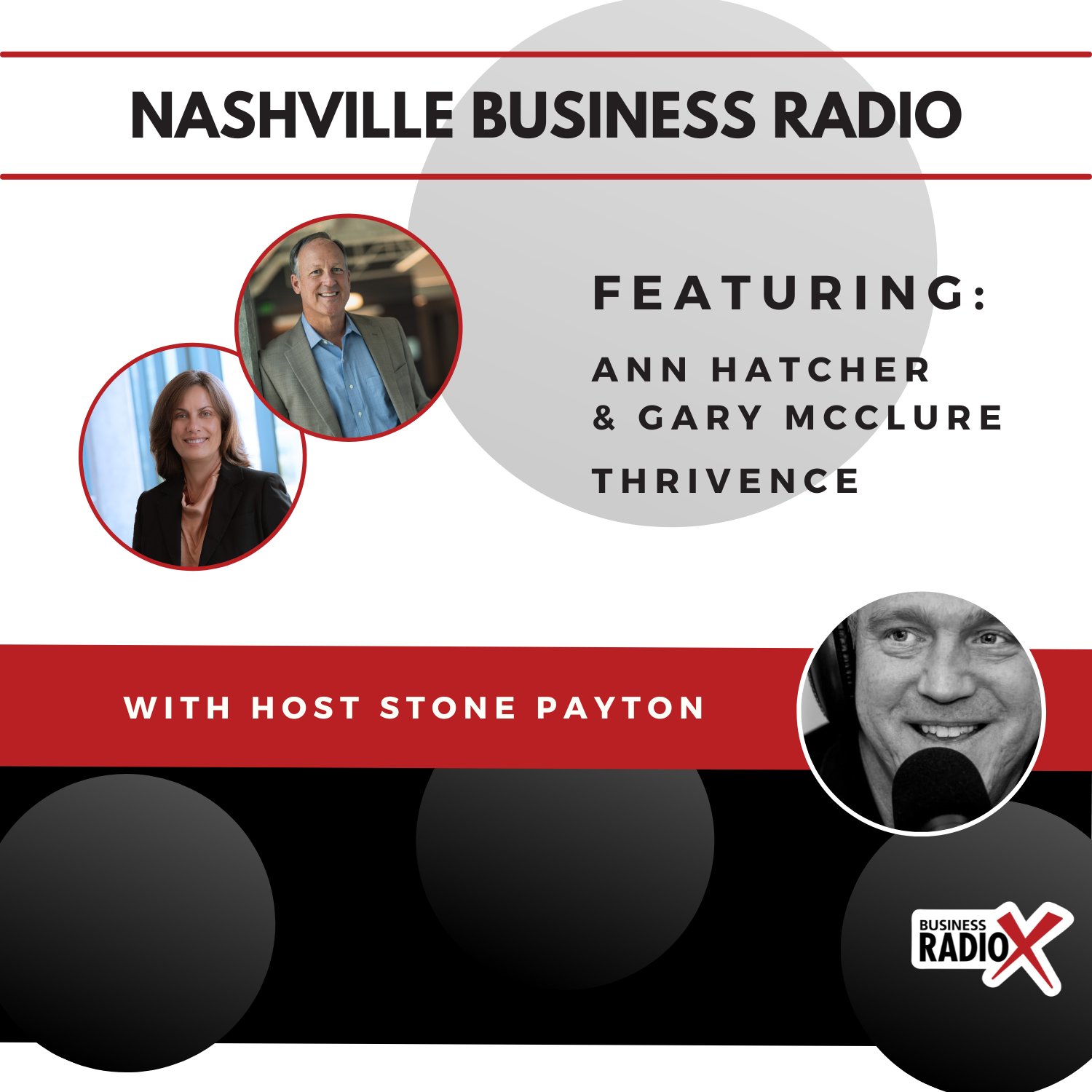How to Hire Better Talent: Thrivence Consultants Featured on Nashville Business Radio

Our consultants Ann Hatcher and Gary McClure recently had the opportunity to sit down with Nashville Business Radio to discuss one of the biggest challenges organizations face today: hiring the right talent. Despite having access to countless job boards and professional networks, finding the perfect fit can still feel like searching for a needle in a haystack.
During the interview, they explored:
✅ The key hiring challenges organizations are facing today
✅ Why it’s difficult to find the right talent, even with so many resources at your disposal
✅ How AI-powered methods we use at Thrivence are revolutionizing hiring decisions
✅ The role AI plays in improving the talent acquisition process
✅ Why your employer reputation is more important than ever when it comes to attracting top talent
If you’re curious about how cutting-edge AI and a strong employer brand can transform your talent acquisition strategy, you won’t want to miss this conversation.
Ready to transform your recruiting strategy? Check out our AI-powered service, TalentOptix.
Read the full transcript:
Intro: Broadcasting live from the Business RadioX studios in Nashville, Tennessee. It’s time for Nashville Business Radio. Now, here’s your host.
Stone Payton: Welcome to another exciting and informative edition of Nashville Business Radio. Stone Payton here with you this afternoon. Please join me in welcoming to the broadcast with Thrivencence Ann Hatcher and Gary McClure. It’s a delight to have you on the show. I got a ton of questions. We probably won’t get to them all, but maybe a good place to start is if you could just kind of paint us an overview, give us a little bit of a primer on mission purpose. What are you and your team really out there trying to do for folks?
Gary McClure: Sure, I can take that one. This is Gary and Thrivence has been around for a couple of years, and in short, we just say we love to help organizations go further, faster. And so what that really looks like is a few different service areas around workforce improvement and strategy. We help companies around data and technology leadership, operational improvement. So as a management consulting firm, we primarily work with leaders all across the country. It’s a lot of fun.
Stone Payton: Well, it sounds like good, noble, purposeful work if you can get it. And I’ll ask each of you individually, but we’ll start with you, Gary. What’s the backstory, man? How did you get into this line of work?
Gary McClure: Well, I can start and then Ann can fill in. I’ve been a management consultant for about 16 years before that, 20 years in corporate marketing, and I just get a lot of joy out of coming alongside leaders and helping them do what they do better.
Stone Payton: How about you, Ms. Ann?
Ann Hatcher: So my whole career has been spent in human resources inside companies, primarily in health care. I’d like to say I’ve done all the good things in HR. So recruiting and employee development and retention. And in my last role, I had the opportunity to lead the HR function at a really large health care company. And after that role I thought, wow, I want to take the things that I’ve learned and maybe bring them to some more companies. So I’ve loved doing that at Thrivence. And so I get to do what I feel like I do best and work with a lot of really great leaders and companies out there.
Stone Payton: So and two plus years into this expression of your work, what are you finding the most rewarding? What’s the most fun about it for you these days?
Ann Hatcher: I always love the start of things.
Ann Hatcher: I like building relationships, learning what’s going on at this company. How is it different from other organizations? How are their goals a little bit different, but how can I bring some of my knowledge about how we’re all kind of the same? And I really love exploring how companies are addressing some of the emerging challenges, like what are they doing about mental health for their employees right now, or what are some unique ways that companies are trying to get people to join them and stay with them. So working with a lot of different companies, I get to see a little bit of what’s new and different now.
Stone Payton: Am I accurate in saying that you guys have an area of expertise, a stream of work, and some real experience and specialized knowledge around helping organizations with their with their hiring challenges?
Ann Hatcher: Yeah, thanks. We have several people on the team who have a recruiting background, building and leading what we call talent acquisition organizations and companies. And a lot of us also have a really strong marketing background. So we’re able to bring those things together, as well as our emerging understanding of how to leverage artificial intelligence as a tool. We’re able to bring all these things together to help companies really amp up their hiring.
Stone Payton: Well, I may be projecting some of my own woes onto other people, but I’m operating under the impression, even with the advent of all the job boards and the platforms, where theoretically we would all be able to connect and learn more about each other. Hiring is not getting any easier, is it?
Ann Hatcher: Well, you know, that’s that’s a great point. You’re not projecting. You are absolutely reading what’s going on out there. So a couple of things going on in the labor market from my perspective, we all know there’s just not enough supply. So recently we worked with an engineering firm that is trying to grow. The nation is not producing enough engineers. So kids go get an engineering degree. But it’s not just that jobs exceeds supply. The labor market participation has been going down over the last many years, and we can talk about some of the reasons why that’s happening, like the gig economy, but there’s just fewer people out there and the labor market has become a little more stable, too. So people aren’t moving around as much as they were in the immediate post Covid time.
Stone Payton: Well, and you mentioned a moment ago you brought up, I talk a little bit about the role that AI is playing, should be playing and maybe even cheer if you’re doing it how you’re bringing it to bear.
Gary McClure: Yeah, what we’ve seen, especially in marketing and HR, they’re typically the quickest to embrace AI. Um, and you know, for HR some of the use cases are pretty standard, like resume screening and candidate matching. Those have been around for a few years. But what we’ve seen in some of the common applications are enhanced job descriptions and job postings. So I can really help companies craft these descriptions to be more compelling and inclusive and also very, very targeted. It’s amazing how they can have personalization and targeting toward a desired audience. Onboarding and training is another area of stone where we’re seeing AI be really, really effective. But I think some of the more fun areas gaining popularity are using AI for sourcing. So I can identify what we call passive candidates. These are people who are not really actively looking for a new job, but they can be, um, impressed to change. And so I can go scan job boards and social media and other platforms really, really effectively. Chatbots is another area. I think we’ve I think we’ve all experienced chatbots online so far. And you know, air is no exception on that. However, we really don’t recommend using chat bots, at least not yet, because there’s still some some risk involved around mistakes and biases. But I think one of the most interesting aspects that we’ve seen with AI and recruiting is video interview analysis. It’s really amazing what I can do here. So some of these tools will analyze video interviews, and they’ll look at candidates soft skills and communications abilities and even their personality traits. It’s absolutely amazing. They can measure hone how they say things body language, facial expressions. It’s really, really impressive. So those are just a few examples and we’re seeing new ones every day it seems like.
Stone Payton: Well, that is a fascinating idea. Never even crossed my mind. A video interview analysis. Of course. Over the years I’ve been very blessed to hang out with some people that were very good at assessing those things in person. But to have I, that is, I’ve got some homework to do. I got to get on the other side of this. Oh man, that is very cool. Well, let’s dive into the work a little bit. Uh, you know, and we can cite specific use cases. Of course you don’t. You probably don’t want to name any names, but let’s just walk through an engagement if that’s the right word. And you could use, you know, the Business RadioX network as a use case. But I’m particularly interested in, like, what happens early on. You know, we come to you, we need people to run studios or we need people to help us do this task or this task. Yeah. Walk us through your your process, if you would.
Ann Hatcher: I would say the first step. And honestly, in my experience, companies don’t really spend enough time right here is know what you’re looking for. If you don’t know what you’re looking for, you’re never going to find it, right? And that’s when we end up settling on candidates. And so a way that we help companies with that is let’s identify your gold star ideal candidate. And the great news is you probably have a lot of people in your organization who are absolutely gold stars. So let’s look at those people and identify, well, what is it that they do that’s so great. And how did they get there? And we can kind of reverse engineer a profile based on those gold standards. Then we take that. And then the next step is to use some of the tools that Gary just explained to update all of your career and recruitment marketing. So where do people like your Gold star candidates? Where do they hang out? What do they care about? Who do they pay attention to? Let’s take all that information and craft some really compelling messages that target those people. So we’re really pulling out those passive candidates like Gary described.
Stone Payton: Another challenge for me. I don’t feel like I’m particularly good at conducting the interview or interviews themselves. I lean much more comfortably into being a cheerleader, and if someone tells me they can do something, I believe them in working with you guys, would would we maybe pick up some insight on how to be better at the interviewing and selection process? Or is it something we turn over to you largely? Or. Yeah, any counsel on that front?
Gary McClure: Well, it’s interesting that you asked that because one of the things going back to I, one of the things that we’ve leveraged AI for is exactly what you’re talking about, Stone. Sometimes we work with recruiters, and if listeners have ever worked with recruiters, they can be really generic in their approach. And so what we try to do is come alongside a particular recruiter and explain, here’s the role, here’s the the perfect candidate that Ann was describing. And we use AI to really ask more robust and insightful questions that are more specific to the role. So in other words, we equip them with questions that deal more specifically with skill sets or with personal characteristics or qualities experience in the marketplace. All of these things can be much more specific and insightful using AI. It’s really impressive, and.
Stone Payton: I got to believe that doing good work on this front has to have a direct and immediate and very bottom line important impact on retention, like go get them, get the right ones. But if you if you get the right ones the right way, it’s got to have an impact on retention. Yeah.
Ann Hatcher: So if we’re going out there and we are looking for people who can be high performers, right? Because we’ve defined what that looks like. And we know what those people, where they come from and what their profiles are, we can take advantage of one of the things we know is the biggest driver of retention. The biggest driver of retention is that I work with people who are also high performers. So if we just kind of create this wonderful, virtuous cycle, another way that we help companies and we do this within our own organization is building referral programs. So another big key to retention is that I work with my friends. And so when we help people, you know, really and sent them to help us in the recruiting challenge, we’re going to get people who stick around a lot longer, get them in here faster, keep the good ones on board them really fast so that they can get to work. That’s what new employees want. I want to get to work, and I want to start making a difference right away.
Stone Payton: So how does the whole sales and marketing thing work for a practice like yours? Is it coming to you from referrals, or do you still find yourselves also out there having to shake the trees a little bit? How do you get to new business?
Gary McClure: Yeah, you mentioned both of them and primarily it’s referrals. We take a lot of pride in doing a great job and it’s not transactional stone. We don’t we we don’t come alongside a company and do a discrete project and then say good luck. A lot of times it’s getting in. They say, hey, can you help us with X, whatever X may represent. And then we do a great job and they say, hey, while you’re here, could you help with Y and Z. And so it’s it’s very much a relationship business. And so our hope is that we do such a great job with this particular company that they’ll refer us to some of their, their colleagues in other parts of the industry.
Ann Hatcher: So we’d love to offer your listeners a chance to get a little taste of what we do, too. So if they want to go to our website, it’s talent. Optics. Optics. That’s our talent acquisition. Ai enhanced process. So talent. Optics.com. They can fill out a little form and we can help them with an AI enhanced job description for free.
Gary McClure: Kind of a before and after. Right. You can see the, uh, the impact that AI can make and our consulting.
Stone Payton: Very cool. It occurs to me that if you have a great reputation and you really need to leverage it, and if you have a non-existent reputation, you need to do some work on that. What counsel, if any, do you have on on that front? Because I got to believe it’s going to have a real impact on this, on finding good people and at least having a conversation with them.
Gary McClure: You know, it does. That’s a neat perspective. Stone. I, we share that. We think that an organization’s reputation or brand, however you want to, to couch it. I think it often gets overlooked and its importance around recruiting and hiring, but we actually think it’s it’s a critical role in the ability to attract talent. And so yeah, we think, you know, first impressions are huge. How can you enhance your, your brand or your reputation in the marketplace to attract those great candidates? There’s competitive advantage. There’s a lot of good reasons to make sure your reputation is strong.
Stone Payton: We’ve probably kind of touched on it already, but I want to ask it more directly. I know in our line of work there are some preconceived notions, just some outright things that people believe to be true about our arena, that just it’s just off the mark. And we often expect to for that to surface and for us to have to educate people around that. Are there some some patterns, some myth busting kind of things that you find yourself having to do, especially early in your conversations with with firms?
Gary McClure: Well, I’ll go back to something I mentioned a second ago, and Ann can chime in with her experience as well. But a lot of times some leaders will come to us and they say, here’s the the challenge that we have and they’ll self-diagnose. They’ll often say, hey, we believe that we need X again, whatever solution they think they need. And we come in. We do a lot of upfront work around diagnostics and evaluations and discussions. It’s that due diligence that we really think is so crucial before we start a solution. And what we find often Stone is that they they said it was X and we believe it’s x prime or something that’s somewhat tangential to say, you know what? Yes, we can help you with your your issue and your proposed solution, but I think we probably need to do a little bit of work over here first, and most of the time they’re so open to that.
Ann Hatcher: That’s a great point, Gary. I worked with a company that was certain it had a recruiting problem. And then when we when we scratched at it a little bit, we found that what they really had was a retention problem. And we could they could recruit all day long and get a lot of people in the door, but they were walking out the back door as soon as they came in.
Stone Payton: So have you guys. Have you had the benefit of one or more mentors that have kind of helped you navigate the terrain of, you know, you’re doing all this, you’re practicing your craft and you know, you got to run a business. Have you had a little help along the way, or is it all, you know, built on on scar tissue and school of hard knocks?
Ann Hatcher: Okay. I’ve had help along the way all the time from, I’ll say, guardian angels to lots of people who show up in my life. One of them is Gary McClure, who’s on this call right now. We all have a of a mentor here in town in Nashville? Um, who’s who’s pretty well known, who has helped us find positions and find new business. Um, I had a fantastic mentor at a prior employer where I was for a long time. And what I’ll say that particular mentor did for me was helped me see skills and capability and potential that I didn’t know that I had and really pushed me to try new things.
Gary McClure: Yeah. And then I would add a little bit different perspective. I mean, I would echo that, but in addition, I’ve been so grateful for the leaders that we’ve served. Again, I mentioned I’ve been doing this for about 16 years, and it’s really both sides of the fence stone. And by that I mean I’ve seen leaders that I just want to emulate. I’m like, oh my gosh, what a what a great practice. Or I love that technique. And I’ll write it down and I’ll try to remember it. But on the other side of the fence, I’ve also seen, unfortunately, some some very horrible examples of leadership. And the lessons are just as true. Right? I mean, you’re like, I, I hope I don’t ever do that. And you know, what can I learn from this situation? So I think it’s almost like going back to school just in service of other leaders.
Stone Payton: What an excellent point. You can learn a ton from good clients, can’t you?
Gary McClure: That’s right. And bad ones too.
Stone Payton: And bad ones too. That’s right. How about the I guess I’ll call it a shift. It looks that way from my vantage point to to more and more remote, or at least hybrid roles. Does that require a little different recipe in your in your recruiting and selecting?
Gary McClure: Probably. That is the single most. I’m kind of thinking in my head here, probably the most Impactful, um, shift in the marketplace. You know, ever since Covid, of course, as far as recruiting and hiring practices, yeah, I think you’re spot on. I mean, there’s some positive things. There’s some negative things. I think one of the positive things that we’ve seen is that now that we’re remote or hybrid regarding especially recruiting, it’s expanded the market. I mean, think about it. If you’re remote, you can be pretty much anywhere in the world. So it’s opened up a huge base of employees to companies. But if you maybe flip the card over, that also means it’s more competitive because other companies can do the same thing and they have access to the same huge pool. So I guess there’s pros and cons to expanded access. Another thing that we’ve seen from a positive side is a little shift in and focus on skills. So if you think about it, I think a lot of companies are looking for more digital proficiency. Self-management, of course, is a big one because now, you know, working in virtual workspaces, you really have to do the work. And how are companies organized for not only adaptability and flexibility, but holding people accountable for this remote work? I mean, that’s that’s a big challenge, I think, in the marketplace.
Ann Hatcher: You know, Gary, it occurs to me there’s a huge opportunity to so recently, a very large company we’re all familiar with. You probably have their app on your phone right now in easy reach, has has required that all their employees come back to the office five days a week. Well, their employees, just like many of ours, moved away during during Covid and or otherwise, just don’t want to go back to the office. This is a recruiting opportunity. So employers, you know, pay attention to what’s happening in your market, and there could be some great people who are now available to you because their employers have changed their policies.
Gary McClure: Yeah.
Stone Payton: So our employers, they have requirements, expectations even. But I mean, candidate expectations are surely shifting as well. And we we need to at least know what they are and decide which ones we’re going to choose to meet. Right?
Ann Hatcher: Yeah. You know, I’m not a huge proponent of overindexing on generalizations around the generations. I don’t necessarily find that to be really useful, but what I will say is, I would say kind of three pieces of advice to employers. Be fast, be personable, and be human. So by being fast, when you get a great candidate to bite, when you get a nibble, move fast with them. They will not be available very long, so make sure your process is fast. You get them interviewed, you get them an offer, and you get them started as quick as you can.
Ann Hatcher: Also make it a personal process, right? Hold their hand through. This change is hard. We all know that. So make sure it’s a great experience for your candidates and new hires and then be human. We’re all dealing with a lot these days. There’s housing issues, transportation issues. So really spend the time to understand what your candidates and your new hires need to be successful real quick and meet them where they are as best you can.
Stone Payton: I don’t know when and where or how you would find the time, but I’m going to ask anyway. Passions, pursuits. Interests. Hobbies outside the the scope of your work and what we’ve been talking about. Most of my listeners know that I like to hunt, fish, and travel. We’ll start with you. And anything you have a tendency to nerd out about that’s that’s not this stuff.
Ann Hatcher: Well, nerding out is right. So I’ve recently started back to school. I am well into my career. I’ll say you guys can’t see me, but, um. But I really have developed a passion around mental health. And so I’ve gone back to school this year to become a mental health counselor.
Gary McClure: And she’s practicing on me to I need all the practicing on Gary. That’s right.
Stone Payton: How about you, Gary? You sip it on umbrella drinks, or have you got some other interests?
Gary McClure: Well, I to maybe to use a golf metaphor, I’m on the back nine of my career, so I find it very appealing, I guess, to invest in others. So share experiences and wisdom. So my thing that I love doing is teaching. Um, whether it be children, I’ve taught Sunday school at church for gosh, 12 or so years. I also teach at the university level here in Nashville. I teach at Vanderbilt, and then I teach adults through my work. So it’s just so much fun to to share wisdom and life lessons and pour into others.
Stone Payton: I did not realize that I was talking with Professor Gary. That was not in my notes, but now I know. I’d love to leave our listeners, if we could, with a couple of actionable, I’ll call them pro tips. Something to be thinking about doing, not doing. Maybe something that they could be reading on either side of this. Really as a candidate, as someone who’s with an organization that needs and wants to do a better job of recruiting, selecting and developing people. So maybe if each of you could share a tip or two, I think that’d be a good way to wrap.
Ann Hatcher: All right. Thank you. I would say pretend you’re a candidate for a job at your own company. So see what what your candidates see. Go look at your career site. Go Google a job you know and follow the thread. Apply to a job in your own organization. How easy is it? How many clicks do you have to make? I was looking at someone’s website for candidates yesterday, and it made them go to a whole separate page to look at benefits. If I were a candidate, I would stop right there. So put yourself in a candidate’s shoes and take their journey and see what you learn.
Gary McClure: And then I would probably go back to our discussion on AI and how it can impact recruiting. I would just broaden it a little bit to say AI in general around leadership. So many people ask us where, you know, where do I start? How do I start? And I would just suggest to your listeners, pick something small, you know, make it iterative. Meaning is, is AI going to be useful in helping you summarize a book or prepare for a meeting? So think about it on a leadership level, personal. And then once you get familiar with the tools like there’s various gpts you can play with, then you can apply it to your enterprise or your organization at large, but just start small and get familiar with it.
Stone Payton: Marvelous counsel. Well, and Gary, it has been an absolute delight having you on the broadcast this afternoon. Thank you for your insight, your perspective, your enthusiasm. You guys are doing such important work that has such genuine impact for so many of us. Thank you, thank you, thank you.
Gary McClure: It’s done. Thank you, thank you.
Stone Payton: My pleasure. All right, until next time. This is Stone Payton for our guests today, Ann Hatcher and Gary McClure with Thrivence and everyone here at the Business RadioX family saying, we’ll see you again on Nashville Business Radio.



